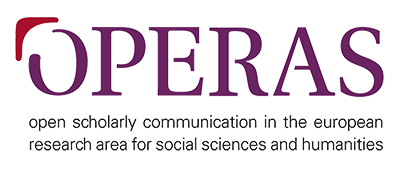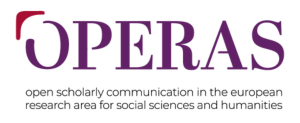
OPERAS in a Nutshell
Definition and Mission
OPERAS is the Research Infrastructure supporting open scholarly communication in the social sciences and humanities (SSH) in the European Research Area. Its mission is to coordinate and federate resources in Europe to efficiently address the scholarly communication needs of European researchers in the field of SSH.
Vision
OPERAS’ aim is to make Open Science a reality for research in the SSH and achieve a scholarly communication system where knowledge produced in the SSH benefits researchers, academics, students and more generally the whole society across Europe and worldwide, without barriers.
Value Proposition: Why OPERAS is needed
The European landscape of scholarly communication in the SSH is currently patchy, fragmented and not organized enough to be efficient, particularly to address the challenge of transitioning to Open Science. This is due to several factors, such as the small size of resource providers, the historical underfunding and lack of sustainability in this area, the variety of technical skills and resources across the community. The nature of the SSH disciplines also adds specific challenges which are not correctly addressed at scale, such as the diversity of publication languages, the entrenchment in diverse cultural backgrounds and the need for specific forms of scholarly communication (monographs, critical editions, and edited bibliographies, amongst others).
By fulfilling its mission, OPERAS provides the research community with the missing brick it needs to find, access, create, edit, disseminate and easily and efficiently validate SSH outputs across Europe. In one word, OPERAS unlocks scholarly communication resources and enables the whole field to reinvent itself in the new Open Science paradigm.
What OPERAS is not
OPERAS is not an e-infrastructure: e-infrastructures such as GEANT, EGI, PRACE, OpenAIRE, and EUDAT provide underlying digital services across all disciplines. They are “discipline-neutral” and not linked to the peculiarities of research practices in a specific discipline. OPERAS addresses the needs of researchers only in the SSH, according to their specific practices.
OPERAS currently cooperates with EGI and OpenAIRE.
OPERAS is not a Research Infrastructure specifically dedicated to research data in the SSH such as DARIAH, CLARIN, ESS, SHARE, CESSDA, and E-RHIS. Because the management of research data can be very specific to the different disciplines (data in arts and in demography are not the same), they need specific infrastructures to support their management. On the contrary, scholarly communication and publication needs are quite similar across the SSH disciplines, with slight variations that can be addressed altogether by a dedicated infrastructure.
OPERAS currently cooperates with DARIAH, CESSDA and CLARIN.
OPERAS is not only a network such as ENRESSH, GO FAIR, EASSH, AEUP. Networks mainly foster and support collaboration between the members of a community. Even though OPERAS also provides support in that area, it does moreover deliver services to the whole community and takes responsibility to develop and operate those services as an infrastructure.
OPERAS currently cooperates with ENRESSH, EASSH, AEUP and GO FAIR
OPERAS is not a single-sited infrastructure such as HL-HLC and ESS, but a distributed infrastructure which is the logical consequence of its coordinating mission. Led by two French infrastructures, OPERAS is however fully European with its 53 members from 16 countries and the commitment of its Core Members from France, UK, Germany, Italy, the Netherlands, Poland, Greece, Croatia, Slovenia and Portugal, who establish OPERAS’ strategy.
Finally, OPERAS is the European Research Infrastructure dedicated to open scholarly communication in the social sciences and humanities.
